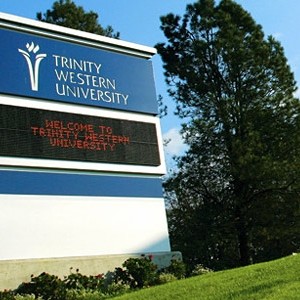 VANCOUVER, B.C. — The top court in British Columbia has ruled that a proposed Christian law school may not be denied accreditation over its requirement that students and staff sign a covenant that includes language affirming marriage as being between a man and a woman.
VANCOUVER, B.C. — The top court in British Columbia has ruled that a proposed Christian law school may not be denied accreditation over its requirement that students and staff sign a covenant that includes language affirming marriage as being between a man and a woman.
“To do so is an expression of its right to freedom of religion,” the British Columbia Court of Appeal wrote on Tuesday. “The Law Society’s decision not to approve TWU’s faculty of law denies these evangelical Christians the ability to exercise fundamental religious and associative rights which would otherwise be assured to them under s. 2 of the Charter.”
As previously reported, Trinity Western University has three concurrent lawsuits running against various provincial legal societies that have denied approval for the university to open an accredited law school due to its stance on marriage. Last August, the university filed suit against the Law Society of British Columbia after the Society withdrew its initial approval following a member’s referendum in October 2014.
“According to the Bible, sexual intimacy is reserved for marriage between one man and one woman, and within that marriage bond it is God’s intention that it be enjoyed as a means for marital intimacy and procreation,” the university policy reads. “Honoring and upholding these principles, members of the TWU community strive for purity of thought and relationship, respectful modesty, personal responsibility for actions taken, and avoidance of contexts where temptation to compromise would be particularly strong.”
Students and staff must sign a covenant committing to personally uphold these lifestyle standards.
In December, the Supreme Court of British Columbia ruled in favor of Trinity Western University, scolding the Law Society for treating the school unfairly by not balancing its Charter rights with that of homosexual students.
“There is no basis upon which a conclusion could be drawn or any evidence from the Special General Meeting or the October Referendum proceedings that the LSBC’s (Law Society of British Columbia’s) membership considered, let alone balanced, the petitioners’ Charter rights against the competing rights of the LGBTQ community,” wrote Chief Justice Christopher Hinkson.
“I find that given inappropriate fettering of its discretion by the LSBC and its failure to attempt to resolve the collision of the competing Charter interests in the October referendum or the decision, the appropriate remedy is to quash the decision and restore the results of the April 11, 2014 vote, and I so order,” he declared.
The Society then appealed the decision to the British Columbia Court of Appeal, which unanimously agreed with Hinkson on Tuesday.
“The Law Society’s decision not to approve TWU’s law school is unreasonable because it limits the right to freedom of religion in a disproportionate way—significantly more than is reasonably necessary to meet the Law Society’s public interest objective,” the court wrote.
“A society that does not admit of and accommodate differences cannot be a free and democratic society—one in which its citizens are free to think, to disagree, to debate and to challenge the accepted view without fear of reprisal,” it said. “This case demonstrates that a well-intentioned majority acting in the name of tolerance and liberalism, can, if unchecked, impose its views on the minority in a manner that is in itself intolerant and illiberal.”
University officials cheered the outcome. The Society is considering an appeal to the Supreme Court of Canada.
“The Court of Appeal unanimously agreed that the Community Covenant is not a breach of the Charter of Rights and Freedoms,” Earl Phillips, the executive director of TWU’s proposed School of Law, said in a statement. “It is not unlawful discrimination. Further, they ruled that the majority must not be allowed to defeat the rights of the minority TWU community to honor its own values. Members of that community are entitled to make space to exercise their religious convictions.”
Become a Christian News Network Supporter...


